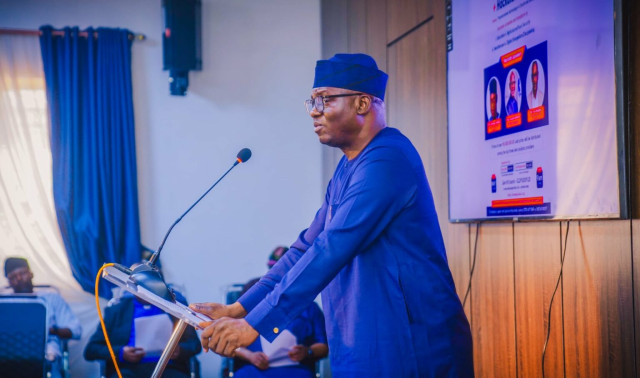The rise of Prof Nentawe Yilwatda, a northern Christian from Plateau State, as the National Chairman of the ruling All Progressives Congress (APC) has sparked speculation that the party may be considering a Muslim-Muslim ticket for the upcoming 2027 presidential election.
This political strategy has ignited a debate among supporters from various political and religious backgrounds.
Reports reveal that the APC's decision to adopt a Muslim-Muslim ticket for the 2023 general elections led to significant controversy, with accusations from the opposition of an Islamization agenda.
At an emergency National Executive Committee meeting at the Presidential Villa in Abuja, President Bola Tinubu appointed Yilwatda to replace Dr. Abdullahi Ganduje, a Muslim who recently stepped down due to health issues.
Political observers regard Yilwatda's appointment as a strategic move by the ruling APC, suggesting it signals future intentions ahead of the 2027 presidential election.
The APC faced backlash in 2023 when Bola Tinubu, a southern Muslim, chose Kashim Shettima, a northern Muslim, as his running mate, drawing criticism from many Nigerians, particularly within the Christian community, who raised concerns about inclusivity and democratic representation.
controversy over the Muslim-Muslim ticket continues to be a contentious topic in some regions of the country.
The debate gained momentum recently when the Arewa Youth Movement, a prominent northern Muslim group, urged President Tinubu to select a northern Christian as his running mate for 2027, underscoring the need for religious balance in leadership.
Echoing this sentiment, another Muslim advocacy group, Concerned Northern Muslim Ummah, also called for a Christian running mate in May, emphasizing the importance of national unity, political fairness, and religious balance.
However, the Presidency downplayed the significance of this debate, asserting that the previous Muslim-Muslim ticket issue has been resolved by the Tinubu-Shettima administration's performance, which they argue has alleviated concerns about any underlying religious agenda.
The Special Adviser to the President, Bayo Onanuga, stated in an interview that many potential running mate candidates are Muslims, indicating that this topic should no longer be a point of contention.
Recent discussions within the APC have focused on whether Tinubu should retain Shettima as his running mate for 2027.
Tensions arose during a North-East APC stakeholders’ meeting when key figures failed to mention Shettima's name while endorsing Tinubu for re-election.
Yilwatda's appointment has shifted the narrative, raising hopes for Shettima's continued involvement, especially considering that former Presidents Muhammadu Buhari and Olusegun Obasanjo consistently kept the same running mate during their tenures.
Following Yilwatda's appointment, the Muslim-Muslim ticket debate has resurfaced. Some speculate that nominating a Christian to lead the party's campaign for 2027 could be a tactical decision to facilitate a similar Muslim-Muslim ticket in the next election.
After Yilwatda's emergence, Ashiru Pandum, an aide to an APC senator, highlighted the numerous strategic positions held by Christians within Tinubu's Muslim-led presidency, asserting that this reflects a balanced approach.
Conversely, Prince Ikenga NwaChineke, a member of the Obidient Movement, challenged this perspective, questioning whether Christian appointees in a Muslim administration have significantly benefited Nigeria.
He criticized the current administration's failures and called for unification to remove them in the 2027 elections. Additionally, lawyer Opeyemi Bodunde commented on Yilwatda's appointment reflecting Nigeria's political diversity and potentially paving the way for another Muslim-Muslim ticket.
In interviews, various Christian leaders and political analysts expressed differing opinions on the possibility of another same-faith ticket.
Some believe Yilwatda's rise may alleviate concerns about marginalization, particularly in the North Central region, while others maintain that if the current Muslim leadership has not hindered governance, there is merit in continuing with a Muslim candidate.
Rev. Joseph Hayab, Chairman of the Christian Association of Nigeria in Northern Nigeria, supported the idea of a Christian running mate but cautioned against inflaming tensions over the 2027 elections, emphasizing the need to focus on pressing issues facing the country.
Bishop Francis Wale Oke, President of the Pentecostal Fellowship of Nigeria, argued that re-nominating a Muslim candidate would not have political repercussions, asserting that Tinubu has shown fairness.
Bishop Stephen Adegbite of Lagos CAN expressed that, given Tinubu's commitment to equitable treatment, there should be no issue if he chooses another Muslim running mate. Most Rev.
Isaac Ayo Olawuyi, Archbishop of Lagos Methodist Church, argued that governance should not be influenced by religion, suggesting that the focus should be on effective leadership regardless of faith.
Meanwhile, the Catholic Bishops' Conference of Nigeria urged caution regarding the escalating religious discourse, advocating for careful observation of political developments.
An aide to CAN President Archbishop Daniel Okoh reiterated that any decisions regarding Tinubu's running mate are entirely up to the APC and would not comment on political matters.




















